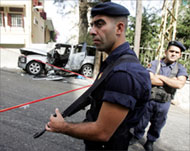FBI agents visit Lebanon blast site
FBI agents have sifted through the debris of the latest of a spate of bombings in Lebanon, responding to requests by a desperate Lebanese government for foreign help in investigating the blast. &nb

It also ratchets up the pressure on Syria to stay out of its neighbour’s affairs.
FBI agents on Wednesday picked through metal fragments and lifted fingerprints from the site where a bomb tore threw a car three days ago near the port city of Jounieh north of Beirut. The explosion maimed prominent anchorwoman and talk show host May Chidiac, whose popular TV station had been opposed to Syria.
Three experts examined Chidiac’s bombed-out vehicle.
Wearing gloves, one sifted through debris while another shot pictures and a third took notes. Journalists were kept behind a police cordon and team members declined to respond to their attempts to get comment.
FBI probe
A black box carried by a team member was marked “explosives unit” with the Washington, DC, address of the Federal Bureau of Investigation.
 |
|
Lebanese journalist May Chidiac |
Both the Lebanese government and US ambassador Jeffrey Feltman took pains to explain that the American assistance was merely of a technical nature, to provide expertise in evidence-gathering to help solve the bombings mystery. But it also carried a message to Damascus, the former overlord of Lebanon for nearly three decades.
Syria, which was forced to withdraw its army from Lebanon in April under US-led international pressure, has been accused by Washington of continuing to interfere in Lebanese affairs.
Syrian officials are reportedly the target of a UN investigation into former premier Rafiq al-Hariri’s assassination. The findings, expected in late October, could reach President Bashar Assad’s regime in Syria, giving rise to public fears of increased violence in Lebanon.
Prime Minister Fuad Siniora has warned of more attacks and drew links between the al-Hariri investigation and the bombings, which have largely targeted people opposed to Syria or areas where anti-Syrian sentiment runs high.
Request for help
Siniora told reporters on Wednesday that Lebanon sought foreign assistance in the latest crime investigation “in order to see how it was carried out”, stressing his government was open to cooperation with all countries that can help.
Siniora rejected accusations that foreign assistance was tantamount to tutelage and pledged: “We will win the battle against terrorism with the assistance of everybody.”
 |
|
The area has been sealed off |
In a boost for the government, the UN Security Council warned that those responsible for terrorist attacks against Lebanese journalists and politicians will not be allowed to jeopardise the country’s stability. In a statement, the council encouraged member states to respond positively to any Lebanese request for assistance.
Until now, Lebanon had shied away from seeking direct US assistance, although FBI agents investigated a bombing in June. The government’s difficulty in identifying those behind the explosions prompted Beirut to look for help.
No arrest has been made in connection with the blasts, and Interior Minister Hassan Sabei underlined the government’s helplessness when he said the country was up against a “phantom” trying to destabilise it.
Anti-Syrian groups have blamed Syria for al-Hariri’s assassination and the recent bombings. Damascus has denied involvement.
Opposition
The issue of American involvement is sensitive. It’s opposed by Hizb Allah, which Washington brands as a terrorist group, and by other pro-Syrian factions, some in the government.
They claim the United States wants to impose its will on Lebanon, and some fear US help could lead to deeper involvement on other issues, including investigating past anti-American attacks in the 1980s.
In Syria, the arrival of the FBI was seen as intervention in Lebanese affairs.
 |
|
Investigator Detlev Mehlis (L) met |
“For sure, they don’t like Lebanon that much. They are coming for other reasons, part of which is uncovering the bombings, but most importantly to study the situation and to spy on Lebanon,” said Elias Murad, editor-in-chief of Syria’s state-run Al-Baath newspaper.
Syrian analyst Imad Fawzi Shueibi said the FBI presence was another chapter in putting Lebanon under international supervision. “Certainly, any internationalisation means setting the stage in Lebanon for what is harmful to Syria,” said Shueibi, director of the Damascus-based Data and Strategic Studies Centre.
UN investigator
Meanwhile, the chief UN investigator into al-Hariri’s assassination, Detlev Mehlis, met with the prime minister.
Details of their discussions were not disclosed, but Mehlis also met late on Tuesday with Justice Minister Charles Rizk, who said the investigator had important information.
UN investigators returned to Lebanon on Friday after questioning officials in Syria, whose army and intelligence units were in control of Lebanon when the massive February bombing killed al-Hariri.